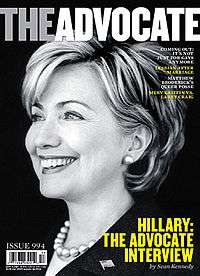The Advocate
|
The Advocate No. 994, October 9, 2007; Hillary Clinton is on the cover | |
| Editor in Chief | Matthew Breen |
|---|---|
| Categories | Newsmagazine |
| Frequency | Bi-monthly |
| Circulation | 175,000 |
| Year founded | 1967 |
| Company | Here Media |
| Country | United States |
| Language | English |
| Website | www.advocate.com |
| ISSN | 0001-8996 |
The Advocate is an American LGBT-interest magazine, printed bi-monthly[1] and available by subscription. The Advocate brand also includes a website. Both magazine and website have an editorial focus on news, politics, opinion, and arts and entertainment of interest to lesbians, gay men, bisexuals and transgender (LGBT) people. The magazine, established in 1967,[2] is the oldest and largest LGBT publication in the United States and the only surviving one of its kind that was founded before the 1969 Stonewall Riots in New York City, an incident that is generally credited as the beginning of the LGBT rights movement.
History

The Advocate was first published as a local newsletter by the activist group Personal Rights in Defense and Education (PRIDE) in Los Angeles. The newsletter was inspired by a police raid on a Los Angeles gay bar, the Black Cat Tavern, on January 1, 1967, and the demonstrations against police brutality in the months following that raid.[3] Richard Mitch (using the pseudonym "Dick Michaels") and Bill Rau (under the name "Bill Rand") joined PRIDE and, along with Aristide Laurent and artist Sam Winston, transformed the newsletter into a newspaper titled The Los Angeles Advocate.[4] The first issue bore a cover date of September 1967, and was sold for 25 cents in gay bars in Los Angeles. By early 1968, PRIDE was struggling to stay viable and Mitch and Rau paid the group one dollar for ownership of the paper in February of that year.[5] In 1969 the newspaper was renamed The Advocate and distributed nationally. By 1974, Mitch and Rau were printing 40,000 copies for each issue.
The newspaper attracted the attention of David B. Goodstein, an investment banker from San Francisco who bought the publication in 1974. Under Goodstein's direction, The Advocate transformed into a bi-weekly national news magazine covering events important to the GLBT community, including the gay rights movement, along with arts and culture. Goodstein also worked toward reducing sex-oriented advertisements in favor of more mainstream sponsors.
Goodstein and Dr. Rob Eichberg created The Advocate Experience. Loosely based on the then-popular EST (Erhardt Seminars Training), it was a two-weekend, all-day series of extensive self-realization workshops to bring self-acceptance, awareness and tolerance within the LGBT community. Goodstein and Eichberg facilitated the workshops for much of their duration. Goodstein's later editorials remained strongly opposed state intervention during the early years of the AIDS epidemic. He argued even though "our lifestyle can become an elaborate suicidal ritual...our safety and survival depends on each of us and our individual behaviour," as opposed to government public health regulations.[6]
Soon after Goodstein's death in 1985, the magazine was transformed from a tabloid-size newspaper format in two sections (with the second section carrying sexually explicit advertisements) to a standard magazine format, beginning with the October 1, 1985 issue.[7] Breakthroughs in straight celebrity covers came under the flamboyant command of editor in chief, Richard Rouilard in the 1980s and early 1990s. After his death from AIDS, this editorial trend continued successfully with editor in chief Jeff Yarbrough. It was during this time that the magazine stopped carrying sexually explicit advertisements, and in 1992 it launched a sister publication, Advocate Classifieds. Under the leadership of its first female editor in chief, Judy Wieder, (1996—2002; editorial director, 2002-2006), The Advocate brought in a variety of voices, won numerous mainstream publishing awards, and set records for newsstand sales, circulation, and advertising. Wieder and her staff's coming-out interviews with such diverse gay luminaries as Ellen DeGeneres, George Michael, Liz Smith, Gore Vidal, Chaz Bono, Jim McGreevey, Melissa Etheridge and Rob Halford garnered the magazine much television exposure and helped to lift the status of "The Advocate Interview" as well as the visibility of the publication.
The Advocate changed hands through a series of mergers and acquisitions, first unsuccessfully with PlanetOut in 2006, and later with Here Media. In a cost-cutting move in 2008, Here Media, conceding that The Advocate print edition could no longer compete with local weekly LGBT newspapers and the Internet for hard news, switched the magazine from a bi-weekly to a monthly publication cycle.[8] Starting in 2010, Here Media consolidated the distribution for The Advocate and Out magazines. The Advocate print version continues to be published and is available enclosed with Out as a combination package via subscription. In 2010 there were press reports of freelance writers not being paid for their work.[9] As of May 2013, The Advocate is no longer produced in-house at Here Media but by Grand Editorial for Here Media. Grand Editorial is a contractor based in Brooklyn, New York, that also produces Out.[10] The Advocate is now published bi-monthly with 6 issues per year.[10]
Comics
The Advocate provided a venue for several noteworthy LGBT cartoonists in the 1970s and 1980s. Early in its history the publication ran single-panel gag cartoons by Joe Johnson featuring effeminate Miss Thing and beefy Big Dick,[11] and "Gayer Than Strange" by Sean. After these were discontinued, It's a Gay Life by Donelan debuted in 1977 and ran for 15 years.[11] Howard Cruse's strip Wendel appeared from 1983 to 1989, transitioning from a single tabloid-size page to two magazine-size pages when the publication changed format. Leonard and Larry by Tim Barela[11][12] and Servants to the Cause by Alison Bechdel also appeared briefly during the late 1980s.
Awards and accolades
In January 2014 The Huffington Post cited three Advocate covers in its feature, "23 Magazine Covers That Got It Right When Depicting Powerful Women": February 2011 (featuring Hillary Clinton), February 2012 (Nancy Pelosi) and January 2013 (Tammy Baldwin, .com edition).[13]
- GLAAD Award nominations (2014)
- Outstanding Magazine Article: "What's Wrong With Exxon?" by Antonia Juhasz (The Advocate)[14]
- Outstanding Magazine Overall Coverage (The Advocate)[14]
- Outstanding Digital Journalism Article: "Prime Timers: Spotlight on LGBT Seniors" (series) (Advocate.com)[14]
- Outstanding Digital Journalism – Multimedia: "We Are Here: LGBTI in Uganda" by Sunnivie Brydum, D. David Robinson (Advocate.com)[14]
Past and present contributors
- Calpernia Addams
- Alison Bechdel
- Adam Block
- Chaz Bono (pre-transition)
- Kate Clinton
- David Michael Conner
- Howard Cruse
- Benoit Denizet-Lewis
- Gerard Donelan
- David Francis
- Michael Joseph Gross
- Allan Gurganus
- Janis Ian
- Josh Kilmer-Purcell
- James Kirchick
- Tony Kushner
- Lance Loud
- Parker Marie Molloy
- Ryan Murphy
- Jasika Nicole
- Jack Nichols
- Robert Opel
- Christopher Rice
- B. Ruby Rich
- Gabriel Rotello
- Vito Russo
- Randy Shilts
- Michelangelo Signorile
- Donald Spoto
- Andrew Sullivan
- Urvashi Vaid
- Bruce Vilanch
- Kenji Yoshino
References
- ↑ Bell, Lauren (August 26, 2008). "The Advocate, under new ownership, cuts frequency". Direct Marketing News. Retrieved January 30, 2014.
- ↑ Sandra L. Caron (February 2008). "An investigation of content and media images in gay men's magazines" (PDF). Journal of Homosexuality. 55: 504–523. doi:10.1080/00918360802345297. Retrieved August 13, 2015.
- ↑ Highleyman, Liz. "What Is the History of The Advocate?". Past Out. Letters From CAMP Rehoboth. Archived from the original on May 3, 2007.
- ↑ Hogan, Steve & Hudson, Lee (1998). Completely Queer: The Gay and Lesbian Encyclopedia. New York: Henry Holt. p. 13. ISBN 0-8050-3629-6.
- ↑ Tobin, Kay & Wicker, Randy (1972). The Gay Crusaders. New York: Paperback Library. p. 80. OCLC 1922404.
- ↑ Goodstein, David (March 18, 1982). "Editorial". The Advocate. p. 6.
- ↑ The Advocate. October 1, 1985. Front Cover.
- ↑ Moses, Lucia (2008-12-19). "The Advocate to Go Monthly". Adweek. Retrieved 2013-06-25.
- ↑ Fleischer, Matthew (July 13, 2010). "'The Advocate' Does Not Pay Its Freelancers". FishbowlLA. Retrieved November 28, 2010.
- 1 2 "The Advocate's Matthew Breen Headed to Brooklyn". MediaBistro.org. FishbowlNY. May 6, 2013. Retrieved June 16, 2014.
- 1 2 3 Theophano, Teresa. "Comic Strips and Cartoons" (PDF). GLBTQ Archive. Retrieved 5 May 2016.
- ↑ The Gay Comics List. "Leonard & Larry". Retrieved 2016-05-04.
- ↑ Vagianos, Alanna (January 27, 2014). "23 Magazine Covers That Got It Right When Depicting Powerful Women". Huffington Post. Retrieved March 10, 2014.
- 1 2 3 4 "GLAAD Media Awards Nominees (2014)". GLAAD.org. Retrieved March 11, 2014.
Further reading
- Robinson, Franklin A., Jr. "Guide to the Lesbian, Gay, Bisexual, Transgender (LGBT) Collection, NMAH.AC.1146" (PDF). Smithsonian Institution National Museum of American History Archives Center. Smithsonian Institution. Issues of The Advocate for 1972–1973 and 1977–1982 are available.
- Streitmatter, Rodger (1995). Unspeakable: The Rise of the Gay and Lesbian Press in America. Boston: Faber and Faber. ISBN 0-571-19873-2.
- Thompson, Mark, ed. (1994). Long Road to Freedom: The Advocate History of the Gay and Lesbian Movement. New York: St. Martin's Press. ISBN 0-312-13114-3.
- Wieder, Judy, ed. (2001). Celebrity: The Advocate Interviews By Judy Wieder. New York: Advocate Books. ISBN 1-55583-722-0.
External links
- Official website
- Corporate site
- Wikholm, Wik. "What Is the History of The Advocate?". PlanetOut.com (Internet Archive). Archived from the original on January 29, 2008. Retrieved January 29, 2008.

